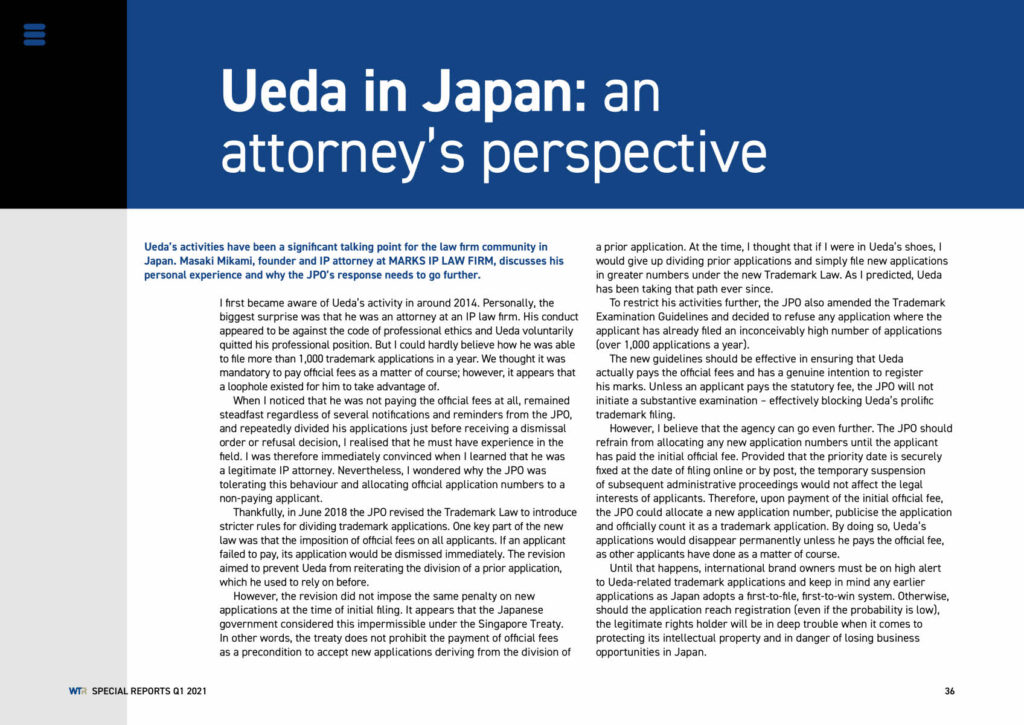元弁理士が数多く商標出願している問題について、マークス代表の三上弁理士が、世界最大の海外商標メディア「World Trademark Review (WTR)」の取材に応じました。記事全文は、こちら(注意:閲覧には登録が必要です)。
[メディア掲載日:2021.4.8]
Ueda’s activities have been a significant talking point for the law firm community in Japan. Masaki Mikami, founder and IP attorney at MARKS IP LAW FIRM, discusses his personal experience and why the JPO’s response needs to go further.
I first became aware of Ueda’s activity in around 2014. Personally, the biggest surprise was that he was an attorney at an IP law firm. His conduct appeared to be against the code of professional ethics and Ueda voluntarily quitted his professional position. But I could hardly believe how he was able to file more than 1,000 trademark applications in a year. We thought it was mandatory to pay official fees as a matter of course; however, it appears that a loophole existed for him to take advantage of.
When I noticed that he was not paying the official fees at all, remained steadfast regardless of several notifications and reminders from the JPO, and repeatedly divided his applications just before receiving a dismissal order or refusal decision, I realised that he must have experience in the field. I was therefore immediately convinced when I learned that he was a legitimate IP attorney. Nevertheless, I wondered why the JPO was tolerating this behaviour and allocating official application numbers to a non-paying applicant.
Thankfully, in June 2018 the JPO revised the Trademark Law to introduce stricter rules for dividing trademark applications. One key part of the new law was that the imposition of official fees on all applicants. If an applicant failed to pay, its application would be dismissed immediately. The revision aimed to prevent Ueda from reiterating the division of a prior application, which he used to rely on before.
However, the revision did not impose the same penalty on new applications at the time of initial filing. It appears that the Japanese government considered this impermissible under the Singapore Treaty. In other words, the treaty does not prohibit the payment of official fees as a precondition to accept new applications deriving from the division of a prior application. At the time, I thought that if I were in Ueda’s shoes, I would give up dividing prior applications and simply file new applications in greater numbers under the new Trademark Law. As I predicted, Ueda has been taking that path ever since.
To restrict his activities further, the JPO also amended the Trademark Examination Guidelines and decided to refuse any application where the applicant has already filed an inconceivably high number of applications (over 1,000 applications a year).
The new guidelines should be effective in ensuring that Ueda actually pays the official fees and has a genuine intention to register his marks. Unless an applicant pays the statutory fee, the JPO will not initiate a substantive examination – effectively blocking Ueda’s prolific trademark filing.
However, I believe that the agency can go even further. The JPO should refrain from allocating any new application numbers until the applicant has paid the initial official fee. Provided that the priority date is securely fixed at the date of filing online or by post, the temporary suspension of subsequent administrative proceedings would not affect the legal interests of applicants. Therefore, upon payment of the initial official fee, the JPO could allocate a new application number, publicise the application and officially count it as a trademark application. By doing so, Ueda’s applications would disappear permanently unless he pays the official fee, as other applicants have done as a matter of course.
Until that happens, international brand owners must be on high alert to Ueda-related trademark applications and keep in mind any earlier applications as Japan adopts a first-to-file, first-to-win system. Otherwise, should the application reach registration (even if the probability is low), the legitimate rights holder will be in deep trouble when it comes to protecting its intellectual property and in danger of losing business opportunities in Japan.

